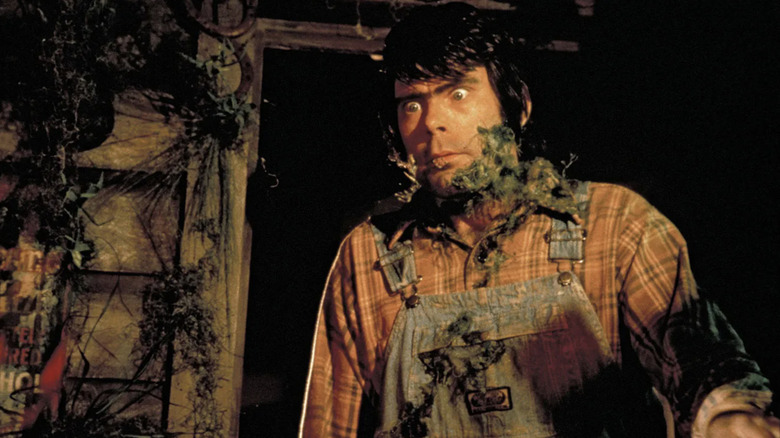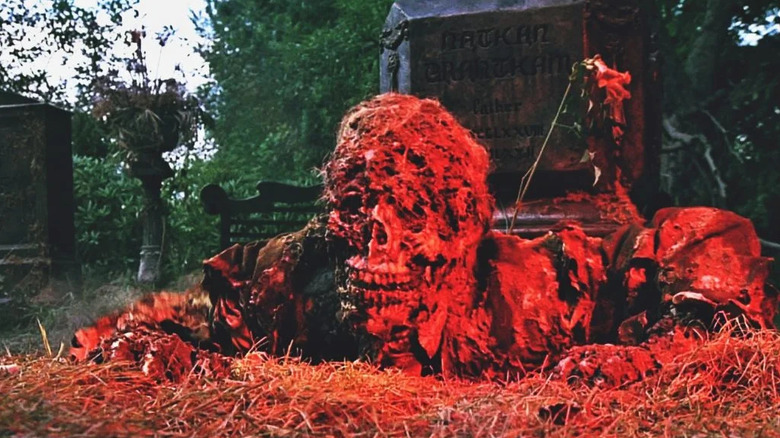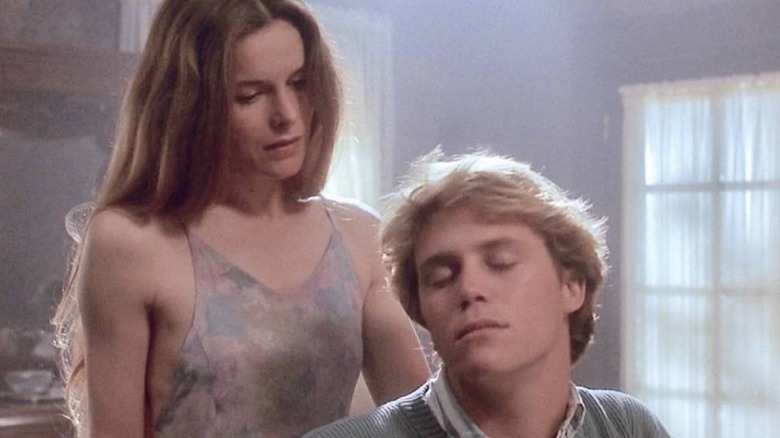Stephen King Had His Screenwriting Debut With This '80s Horror Movie
Stephen King is one of the most prolific authors to have ever lived, and there's no need to put a qualifier on that regarding his primary focus on genre. Whether we're talking about horror fiction or just fiction in general, King's work has made a significant dent across a variety of genres, lengths, and even pseudonyms. When it comes to King material that's been adapted for the screen, however, the majority of movies and television programs indeed fall into the horror genre. While the number of films and shows that have adapted King is fairly large, it pales in comparison to the author's literary output. Thus, where the large majority of King's literature is best-selling and beloved, the filmed versions have a bit more of an uneven reputation. After all, even King himself famously dislikes Stanley Kubrick's film of "The Shining," a movie that is otherwise regarded as a horror classic.
Adding injury to King's screen reputation is the sole directorial effort from the man himself: 1986's "Maximum Overdrive." While the campy, over-the-top slice of '80s cheese has gained a cult following over the decades, there's no denying that its charms are of a more dubious and less straightforward nature than what King's authorship promises. Certainly, its marketing campaign didn't help, as King himself appeared in the movie's trailer, literally promising to "scare the hell out of you." Ironically, King needn't have sold himself that hard, for although "Maximum Overdrive" was his directing debut, King had already proven himself as a screenwriter who actually could move cinema audiences. With assistance from his buddy George A. Romero in the directing chair, King made his screenwriting debut with 1982's "Creepshow." While contemporary critics of the period didn't consider the film very spooky, just about everyone recognized how well the movie worked, enough that it became a hit that Fall, making $21 million over an $8 million budget. "Creepshow" not only helped begin a comeback for the horror portmanteau, but it proved that King could write for the screen as well as the page.
'Creepshow' showcases King's various strengths
As numerous screenwriters and filmmakers have discovered, adapting one of King's often-lengthy novels to the screen intact is no simple task. Either King inherently recognized this or otherwise subverted that issue with his first screenplay, because "Creepshow" is an anthology film made up of five short segments. Although there is a wraparound, this is the type of anthology film where the segments don't intertwine, thus King isn't required to be concerned about an overarching narrative. Some of the author's most famous and beloved works are his short stories, and "Creepshow" demonstrates why that is, as each segment is the perfect length to deliver its individual macabre bon mots.
Of course, King had a good template to follow, as he and Romero sought to fashion the movie as an homage to the classic horror comic books published in the 1950s by EC Comics. These comics were primarily made up of four short horror tales, each with a little O. Henry-style twist at the end, in which the protagonists would get their just desserts. "Creepshow" revitalized this format for the '80s, leading to the popular "Tales From the Crypt" TV series in 1989. Although King is working in a more pointedly playful and ghoulish mode, many of his tropes show up in the film: there are various bullies (especially the adult kind), an alcoholic academic, and so on.
In addition to his writing, "Creepshow" also showcases a peculiar talent of King's: acting. The second segment of the film, "The Lonesome Death of Jordy Verill," sees King playing the titular bumbling fool who comes across a meteor that contains a highly virulent strain of plant life. King gives a delightfully effective comedic performance in the role, turning what could've been a too-cruel tale of a man's deadly fate into a wickedly funny live-action cartoon. Although King would subsequently go on to make cameo appearances in several adaptations of his books and a few films made by friends, he never really pursued acting as a side career. One supposes he was busy enough at his typewriter.
A decade after 'Creepshow,' King wrote his first fully original screenplay
While "Creepshow" counts as King's first screenplay proper, it was not his first fully original work written for the screen. Two of the segments in the film — "Jordy Verrill" (originally titled "Weeds") and "The Crate" — were adapted from short stories the author had penned in the '70s. The next several King screenplays were adapted from other various short stories and novellas, with 1989's "Pet Sematary" being King's first adaptation of one of his full-length novels. Finally, in 1992, the first screenplay written by King expressly for the screen was made: "Sleepwalkers," directed by frequent King collaborator Mick Garris.
Despite these two milestones in King's career being exactly a decade apart, the films couldn't be more different, and that may help explain why "Sleepwalkers" became King's last fully original screenplay. Where "Creepshow" got a lot of mileage out of its bite-sized short story structure, King struggles with the full-length narrative of "Sleepwalkers" a bit. Ironically, the movie feels like an adaptation of a longer book, given how much mythology and backstory King seems to have worked out for the titular half-cat-half-human vampires that are hinted at during the film but never fully laid out. That said, the ambition of "Sleepwalkers" certainly doesn't hurt the movie, and Garris keeps proceedings at a tight 91 minutes, not letting King run away with the film's length. It's just likely that King, who clearly loves the lax restrictions on writing prose, didn't really warm to his experience with writing directly for the screen, choosing instead to focus on adapting his pre-existing work for some future filmed projects.
Although it would be nice to have some more fully original King movies out there, it's still great that we have "Creepshow" and "Sleepwalkers" as unique outliers in the King film canon. And who knows — in 2025 alone, we have "The Monkey," "The Life of Chuck," "The Long Walk," and "The Running Man," four stories and films that continue to prove King's longevity as well as his diversity. King on screen remains as vital and vibrant as ever, so perhaps the writer could be coaxed back to Hollywood to write a brand new story for the screen again. Who knows if or when that might happen, but if it ever did, it'd be a scream.


